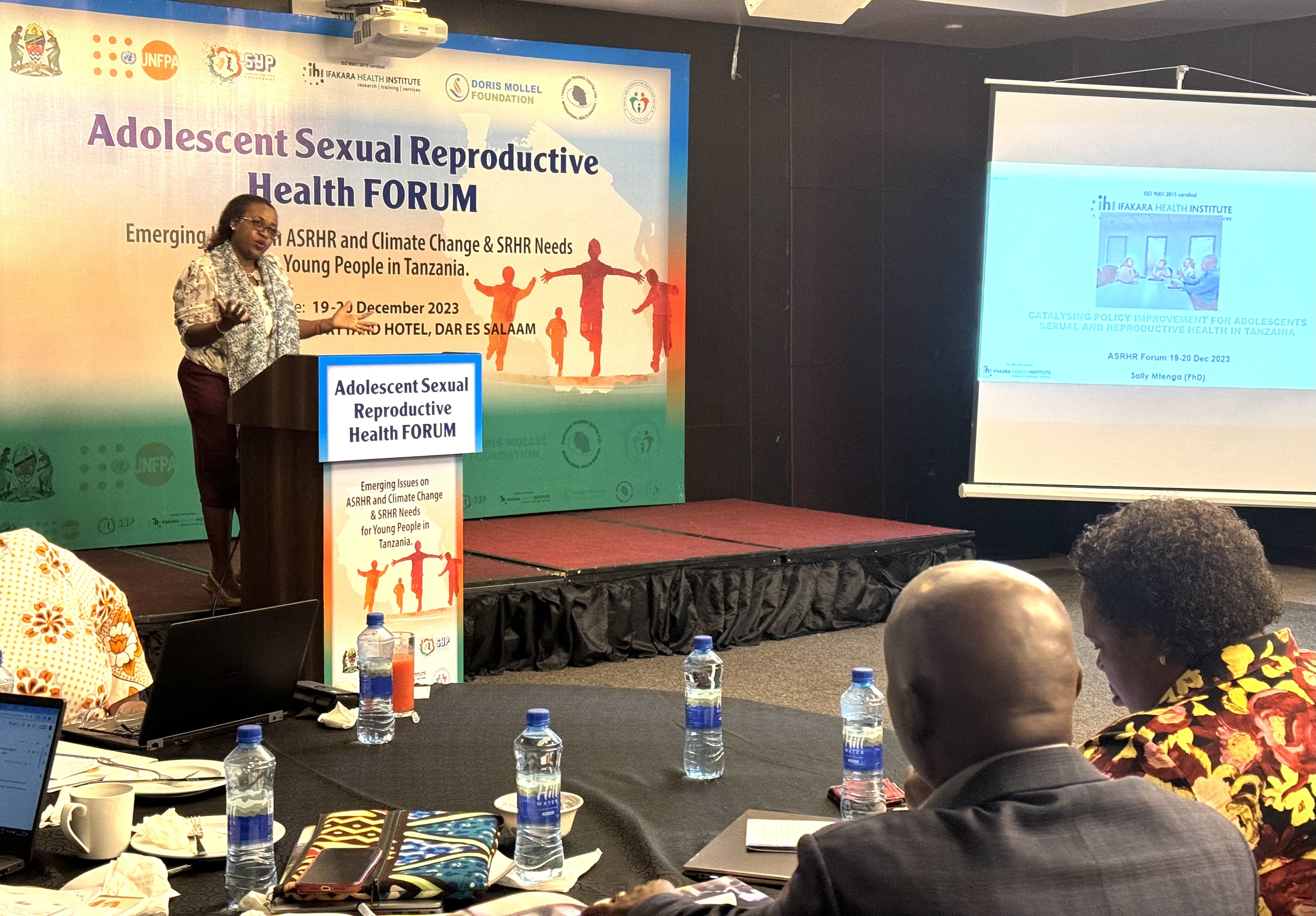
FORUM: From evidence to practice

From December 19 - 20, 2023, Ifakara's Catalyzing Policy Improvement in Africa (CPIA) project presented evidence generated from the study and proposed actions during the Adolescent Sexual Reproductive Health (ASRH) Forum in Dar es Salaam, Tanzania.
The event, under the theme “Emerging Issues on ASHR and Climate Change & SHR needs for young people in Tanzania” was organized by the Ministry of Health and the United Nations Population Fund (UNFPA) is a response to several existing ASRH coordination gaps including those that were identified by the CPIA study led by Dr. Sally Mtenga and Irene Mashashi, revealing a significant disconnect among researchers, youth, policy makers, and funders in addressing ASRH issues.
The platform aimed to bring representatives from each group together to share knowledge and collaboratively find solutions to enhance the approach to ASRH.
On the inaugural day of the forum, Dr. Felix Bundala, Assistant Director of Newborn, Child, and Adolescent Health in the Ministry of Health, delivered opening remarks, encouraging collaborative discussions. He urged the youth to actively participate, contribute their thoughts, and learn from the stakeholders present. Dr. Bundala emphasized the need for swift and intensive action to provide timely information to youth, enabling them to effectively address challenges.
Dr. Mtenga emphasized the need to empower and involve adolescents in policy design and make adolescents on the driving seat of the ‘adolescent health’ agenda. She further highlighted the importance of healthcare providers’ awareness of ASH policies, and the improvement of local funding mechanisms and coordination of ASRH programs.
Additionally, she advocated for strengthened multisectoral collaboration among researchers, policymakers, implementers and non-health sectors, along with developing a monitoring plan for effective ASRH policy implementation.
Ifakara scientist Irene Mashasi highlighted adolescent perceived challenges in utilization of health-friendly services, including privacy and confidentiality issues and long wait times at facilities. Some healthcare providers are not fully equipped for adolescent services.
She also highlighted underlying factors that contribute to adolescent pregnancy, such as: poverty at the family level, adolescent girls have limited power of negotiate on condom use, negligence on using condom despite knowing the side effect of practicing unprotected sex etc.
Negative parental attitudes discourage utilization of ASRH services, fostering hesitation among adolescents to discuss their sexual matters with parents.
During the second day of the forum, Dr. Mtenga co-led in facilitating work groups. The aim of these work groups is to collaboratively draft proposed action plans aimed at effectively addressing the challenges associated with ASRH issues.
Stakeholders discussed strengthening coordination and communication among stakeholders, improving the packaging of ASHR information and services, increasing demand for ASRH services among youth and strengthening monitoring, evaluation, and research in ASRH.
In closing Felister Bwana, a program specialist in health systems at UNFPA and Gerald Kihwele, a Youth Program Coordinator at the Ministry of Health, who are also members of the organizing team, both thanked Ifakara for providing valuable evidence through the CPIA project. These findings “allowed us to have constructive discussions based on what is happening to our youth on the ground” said Felister.
The forum serves as a demonstration of how evidence generated through research, particularly the findings presented by Ifakara, can be translated into practical and actionable steps.
About CPIA project
The project is simultaneously implemented in six African countries, including Tanzania. Other countries are: Senegal, Burkina Faso, Tanzania, Uganda and Mozambique. It aims to improve
policy and help bridge the research-policy gap; and strengthen local capacity.
The project’s funding model encourages external funding and support that is de-colonial by strengthening national leadership and decision-making; alignment and harmonization; and strengthening local research and policy-making systems and institutions.
